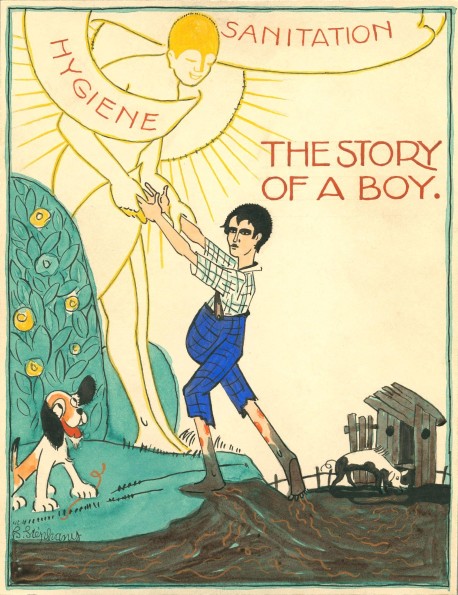
 BD Story of a boy - vers 1920 - courtesy Rockefeller FoundationThe hookworm causes a parasitic infection the history of which helps show how the Rockefeller Foundation impacted on the United States federal healthcare provisions.
BD Story of a boy - vers 1920 - courtesy Rockefeller FoundationThe hookworm causes a parasitic infection the history of which helps show how the Rockefeller Foundation impacted on the United States federal healthcare provisions.
At the beginning of the 20th century, the United States have a strong presence in the medical sector, its growth spurred on by the advent of philanthropic foundations, notably that of wealthy businessman John Davison Rockefeller persuaded by pastor Frederic Gates in 1901 to allot some of his money to medical research and to health developments at global level.
The foundation counted several divisions and enjoyed the support of reformers who saw its potential for shaping public health in a federal country where each state had its own health policy, as well as for modernising its hygiene situation. 1901 saw the creation of the Rockefeller Institute for Medical Research and 1903 that of the General Education Board.
The foundation’s first project was the fight against a disease that affected massively the American countryside. Hookworm disease is caused by two parasitic worms Ancylostoma duodenale and Necator americanus. These infection-carrying worms live in hot and damp environments such as swamps and mudflats. At the end of the 19th century and the beginning of the 20th, the infection was present in Central America, Brazil and notably in the American countryside. The body is not infected by the worms but by their larvae which are born and thrive in warm damp spaces. The larvae infiltrate skin pores and infect the host. The infection may be quite slow, sometimes marked by stomach pains and diarrhoea and, in the most serious cases emaciation and anaemia are caused by loss of appetite. Children are particularly exposed to this disease which can affect their development. An other type of infection affecting the skin and causing a rash and violent itching is known as creeping eruption.
At the beginning of the 20th century, this disease is thus a major issue for the US government for it affects the nation’s country children. South Carolina and Georgia count among the states most infected with ancylostoma. On the basis of this finding and at the instigation of the Rockefeller Foundation the Sanitary Commission for the Eradication of Hookworm Disease was founded in 1909 and placed under the direction of Wickliffe Rose.
The institution ensured the promotion of personal hygiene practices, mostly through the use of advertising and every available media, including cinema. Indeed, there exists no treatments nor vaccines to cure the disease, remains the educational approach via documentaries filmed by the foundation. In 1917, the film Unhooking the Hookworm explained how to avoid the infection through the modernisation of outdoor toilets and by avoiding walking barefoot in infested sites. For the children, a comic strip had also been produced by the Foundation. The Story of a Boy follows the life of a young country lad whose environment is infested with hookworm and who has to learn how to take care of himself by washing his hands and feet.
This innovative approach to health education and the Foundation's International Health Commission's (IHC's) hookworm control were party to the genesis of a new global action by the Foundation the original purpose of which was to provide health education. Indeed, the Sanitary Commission would play a large part in setting up the local administration of public health in the South of the United States and in bringing in new legislation.
The campaign was a success. Numerous reports produced by the government up to 1930 evidence the clear fall in cases in the Southern states turning the infection into a minor disease in the country thanks to the educational work of the Rockefeller Foundation.
To be sure, the disease is still extant in Africa and Asia but, one century on, the means to address it remain the same. The World Health Organisation accordingly advises against skin to ground contacts and against the use of external toilets.
Read more in the dictionary :Encephalitis - Hollywood smile
Read the paper in French : Hookworm
Références :
Tournès Ludovic, « La fondation Rockefeller et la naissance de l'universalisme philanthropique américain », Critique internationale, 2007/2 (n° 35), p. 173-197.
Sealander Judith, Private Wealth and Public Life: Foundation Philanthropy and the Remodeling of American Social Policy from the Progressive Era to the New Deal, Baltimore et Londres: Johns Hopkins University Press, 1997.
To quote this paper : Simon Savouret, "Hookworm", in Hervé Guillemain (dir.), DicoPolHiS, Le Mans Université, 2024.